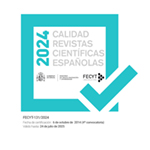El imperio interno: Discursos sobre masculinidad e imperio en los imaginarios nacionales español y catalán del siglo XX
Resumen
Este artículo parte de la idea de que la imaginación post-imperial española después de 1898 englobaba también la temática de los separatismos periféricos, así como la idea de que el proceso de desintegración nacional representaba la fase última del declive imperial español. El artículo analiza la presencia de este imaginario imperial interno en España invertebrada (1922) de Ortega y Gasset, así como sus reverberaciones en los ensayos de Ernesto Giménez Caballero y de Jaume Vicens Vives sobre las relaciones entre Castilla y Cataluña, que interactuaban de modo explícito con España invertebrada. Además, el artículo analiza el juego de poder competitivo que subyace a los imaginarios de la nación español y catalán a lo largo del siglo XX, donde la evocación simbólica del imperio ha funcionado como una anhelada marca de poder masculino, presente en las diferentes propuestas de solución política al conflicto nacional interno.Descargas
Descarga artículo
Licencia
La revista Cuadernos de Historia Contemporánea, para fomentar el intercambio global del conocimiento, facilita el acceso sin restricciones a sus contenidos desde el momento de su publicación en la presente edición electrónica, y por eso es una revista de acceso abierto. Los originales publicados en esta revista son propiedad de la Universidad Complutense de Madrid y es obligatorio citar su procedencia en cualquier reproducción total o parcial. Todos los contenidos se distribuyen bajo una licencia de uso y distribución Creative Commons Reconocimiento 4.0 (CC BY 4.0). Esta circunstancia ha de hacerse constar expresamente de esta forma cuando sea necesario. Puede consultar la versión informativa y el texto legal de la licencia.











